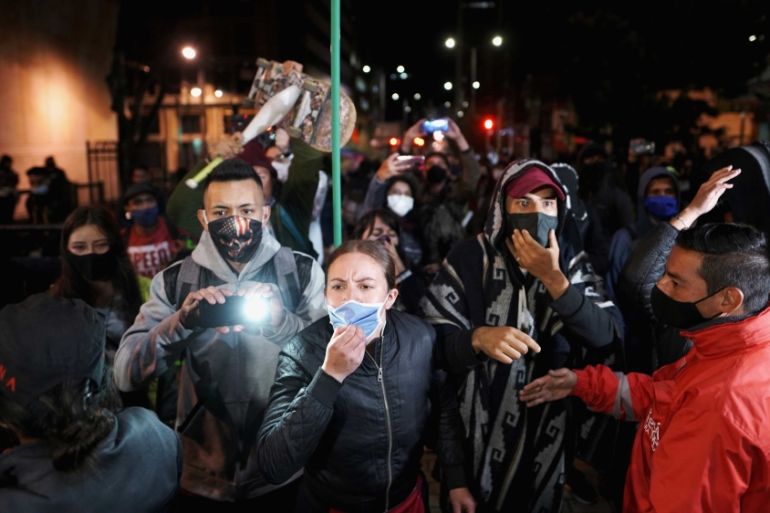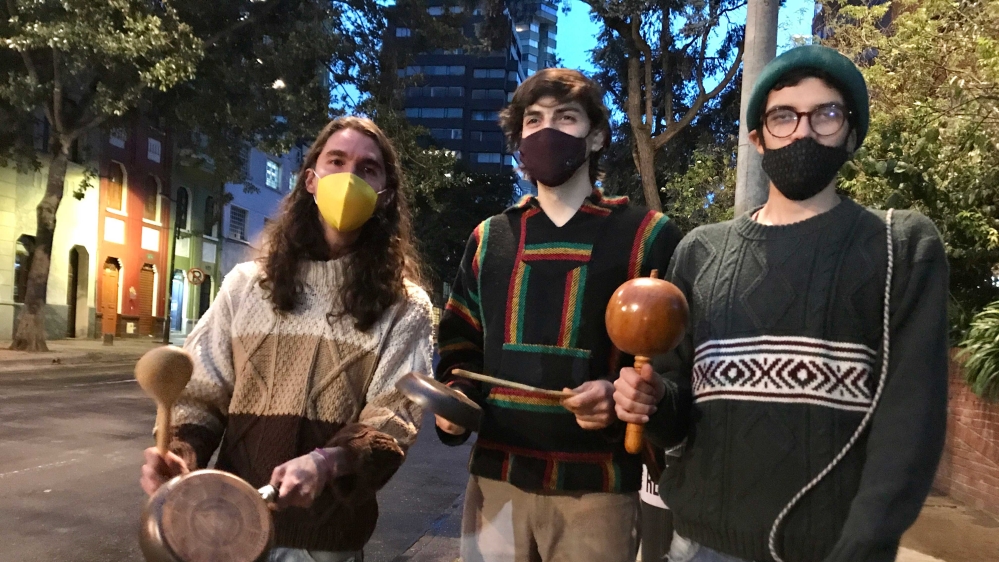Colombians revel, protest over order to detain ex-President Uribe
The Supreme Court decision is likely to further divide the country’s already polarised political atmosphere.

Bogota, Colombia – Colombians took to the streets on Tuesday evening to celebrate and also protest against the Supreme Court order to detain ex-President Alvaro Uribe while investigations against him for witness tampering and fraud continue.
The decision left many citizens shocked. Some pleased, others angered.
Keep reading
list of 4 itemsUS House approves aid package worth billions for Ukraine, Israel
Will India’s election be free and fair?
Togo approves constitutional reform changing how president is elected
Throughout major cities, people stood on the roads and balconies to bang pots and pans and fly the yellow, blue and red Colombian flag. But it was hard to tell who was celebrating the court decision and who was supporting Uribe – possibly the most controversial and polarising living public figure in the country.
“It gives hope that justice is working and that we are in a democratic country,” said Efrain Rincon, a 28-year-old biologist, who was celebrating on the street in a liberal downtown Bogota neighbourhood largely in favour of the detention.
Residents of a downtown Bogota neighbourhood celebrate the Supreme Court order to detain ex-president @AlvaroUribeVel by house arrest while his trail for witness tampering and fraud continues. Supreme Court based decision on “potential for obstruction of justice to take place.” pic.twitter.com/vo1tH7KbrT
— Steven Grattan (@sjgrattan) August 5, 2020
In other parts of Bogota and in Colombia’s second-biggest and more conservative city, Medellin, where Uribe is from, rallies were held in support of the former president.
More such rallies are expected in the coming days. In Bogota, there was an increased police presence in major public squares on Wednesday.
The hardline leader served from 2002 to 2010 and took an aggressive stance against the Revolutionary Armed Forces of Colombia (FARC), a left-wing rebel group. He continues to be an influential figure in the Andean nation which suffered a 52-year armed conflict.
Uribe’s supporters see him as a hero who fought against a violent armed group, while critics highlight the spate of human rights abuse claims held against him, including the strengthening of right-wing paramilitary groups under his presidency that terrorised civilians.
“It is a huge deal for multiple reasons: it’s unprecedented. Never has an ex-president been detained in Colombia’s history, Colombian persons of tremendous influence are often not held accountable for crimes or even seriously brought into a judicial process,” said Gimena Sanchez-Garzoli, Andes director for the advocacy group Washington Office on Latin America (WOLA).
“In the case of Uribe, despite serious links and allegations to human rights abuses he’s managed to dodge or stop judicial processes that implicate him,” she told Al Jazeera.

One of the allegations the Supreme Court is investigating is whether Uribe bribed witnesses to recant claims he formed a paramilitary group in the 1990s.
The court reached the decision to place him under house arrest after concluding there was potential for obstruction of justice to take place, it said in a press release on Tuesday night.
“Senator Uribe will serve out his confinement in his residence, from where he can continue to mount his defense,” it said.
But it was Uribe himself who announced the ruling via his Twitter feed midday on Tuesday.
“The loss of my liberty causes me profound sadness for my wife, for my family, and for Colombians who still believe that I have done something good for the country,” the prolific Twitter user said.
La privación de mi libertad me causa profunda tristeza por mi señora, por mi familia y por los colombianos que todavía creen que algo bueno he hecho por la Patria
— Álvaro Uribe Vélez (@AlvaroUribeVel) August 4, 2020
Many politicians from the Democratic Centre political party, founded by Uribe to which current President Ivan Duque is affiliated, spoke out in his defence, while others supported the court decision, indicating that Uribe should respect it.
Duque, who has been dubbed by many as a protege of Uribe, made an official statement about the decision and said he would always believe in the former president’s innocence.
“The decision is certain to divide an already polarised Colombia,” says Arlene Tickner, a political science professor at Rosario University in Bogota.
“The decision to investigate and to place an ex-president under house arrest is in itself huge. In the case of Uribe, a leader whose portrayal as a patriotic saviour has long placed him above the law, the potential political implications stand to be even greater, in particular if he is convicted of the charges of procedural fraud and bribery,” she said.
Human Rights Watch applauded the decision too. The organisation’s America director, Jose Miguel Vivanco, told Al Jazeera the administration of Duque and the governing party “must respect the court’s decision and ensure judicial independence by guaranteeing that Uribe defends himself through the means provided by law, not with threats of judicial reform and groundless accusations”.
A blow to Uribe, or Duque?
Political analysts, journalists and international organisations have been debating whether the court decision is going to tarnish Uribe’s political legacy or if it will have a bigger impact on President Duque’s administration.
For WOLA’s Sanchez-Garzoli, legacy and image is “everything to Colombian politicians”, especially presidents.
“Uribe expended a lot of energy crafting his international image as the hardliner against the FARC and terrorism, the person who got Colombia’s security situation under control and advanced commercial interests,” she said. “His image is now stained.”

Some believe politicians in support of Uribe are trying to make this about his legacy, but Sergio Guzman, a political analyst and director of Colombia Risk Analysis, disagreed.
“President Duque is trying to make this about Uribe’s legacy and whether or not Uribe was a good person, or if he saved the country from the abyss … none of that is being decided by the court, they are looking into an obstruction of justice case, period,” he said.
Guzman said what is happening will, however, have more of an effect on Duque’s legacy.
“By taking such a stance to defend Uribe, he has put himself at odds with another branch of government. And all the legislative agenda Duque was expecting to have on pension reform or labour reform, now all of them take a back seat to this case involving Uribe,” Guzman said.